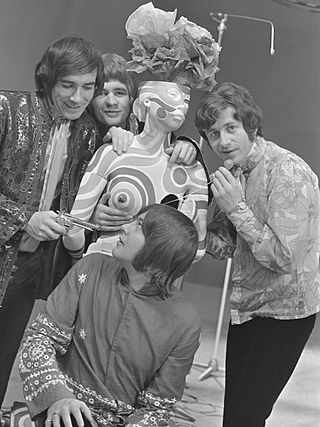
The Flower Pot Men were an English pop group created in 1967 as a result of the single, "Let's Go to San Francisco", recorded by session musicians, becoming a major UK Top 20 and Continental Europe hit in the autumn of 1967. The group's sound was characterised by rich, three-part vocal harmonies.

"Baby I Need Your Loving" is a 1964 hit single recorded by the Four Tops for the Motown label. Written and produced by Motown's main production team Holland–Dozier–Holland, the song was the group's first Motown single and their first pop Top 20 hit, making it to number 11 on the US Billboard Hot 100 and number four in Canada in the fall of 1964. It was also their first million-selling hit single.

Anthony Burrows is an English pop singer and recording artist. As a prolific session musician, Burrows was involved in several transatlantic hit singles throughout the late 1960s and early 1970s, most of which were one-hit wonders, including "Love Grows " by Edison Lighthouse, "United We Stand" by Brotherhood of Man, "My Baby Loves Lovin'" by White Plains, "Gimme Dat Ding" by The Pipkins and "Beach Baby" by The First Class. During 1970, four singles by four different acts with whom he performed all charted at or near the top of the UK Singles Chart and additionally reached the top 20 in the United States.

Edison Lighthouse are an English pop band, formed in London in 1969. The band was best known for their 1970 hit single "Love Grows " recorded in late 1969.
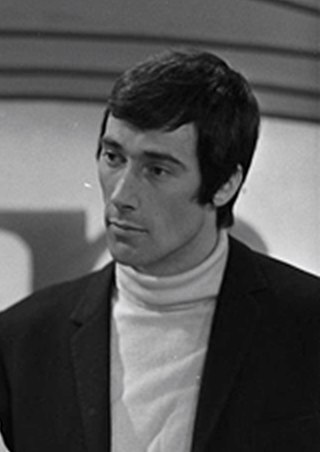
Roger Frederick Cook is an English singer, songwriter and record producer, who has written many hit records for other recording artists. He has also had a successful recording career in his own right.
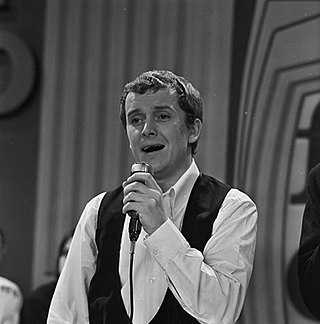
Roger John Reginald Greenaway, is an English singer, songwriter and record producer, best known for his collaborations with Roger Cook and Tony Burrows. His compositions have included "You've Got Your Troubles" and the transatlantic million selling songs "I'd Like to Teach the World to Sing " and "Long Cool Woman in a Black Dress". They were the first UK songwriting partnership to be granted an Ivor Novello Award as 'Songwriters of the Year' in two successive years.

"Heat Wave" is a 1963 song written by the Holland–Dozier–Holland songwriting team. It was first made popular by the Motown vocal group Martha and the Vandellas. Released as a 45 rpm single on July 9, 1963, on the Motown subsidiary Gordy label, it hit number one on the Billboard Hot R&B chart—where it stayed for four weeks—and peaking at number 4 on the Billboard Hot 100.

White Plains were a British pop music group that existed from 1969 to 1976. They had an ever-changing line-up of musicians and five UK hit singles, all on the Deram Records label, in the early 1970s.

"Working My Way Back to You" is a song made popular by the Four Seasons in 1966 and the Spinners in 1980.
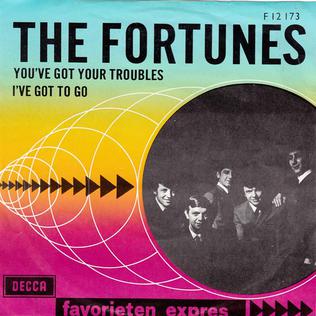
"You've Got Your Troubles" became the inaugural composition by the prolific songwriting team of Roger Cook and Roger Greenaway in 1964. "You've Got Your Troubles" became a number 2 UK hit for the Fortunes in the United Kingdom in August 1965, affording the group international success including a Top Ten ranking in the US. The track was included on the Fortunes' self-titled 1965 debut album release, the group's only album release of the 1960s.

"There Goes My Baby" is a song written by Ben E. King, Lover Patterson, George Treadwell and produced by Jerry Leiber and Mike Stoller for The Drifters. This was the first single by the second incarnation of the Drifters, who assumed the group name in 1958 after manager George Treadwell fired the remaining members of the original lineup. The Atlantic Records release was Ben E. King's debut recording as the lead singer of the group.

"United We Stand" is a song written by Tony Hiller and Peter Simons. It was first released in 1970 by the Brotherhood of Man in their original, pre-Eurovision line-up, consisting of Goodison, Tony Burrows, Roger Greenaway, Sue Glover and Sunny Leslie. It became the band's first hit, peaking at #13 in the U.S., #9 in Canada, and #10 in the U.K. The song spent 15 weeks on the charts, and is ranked as the 64th biggest U.S. hit of 1970. It also reached #8 in Australia.
The Pipkins were a short-lived English novelty duo, best known for their hit single "Gimme Dat Ding", which reached No. 6 on the UK Singles Charts, No. 7 in Canada, and No. 9 on the US Billboard Hot 100 chart in 1970.

"Everybody's Got the Right to Love" is a socially conscious–inspired pop song written by Lou Stallman, produced by Frank Wilson and released as a single in 1970 by Motown group The Supremes, who took the song into the top forty in mid-1970 following the release of "Up the Ladder to the Roof".

"Gimme Dat Ding" is a 1970 popular UK song, of the novelty type, sung by "one-hit wonder" The Pipkins, and written and composed by Albert Hammond and Mike Hazlewood. Released as a single, it is the title selection of an album which The Pipkins recorded and released on the EMI Columbia Records label. It also appeared on a compilation album of the same name, which The Pipkins shared with another up-and-coming UK group, The Sweet. It has also been included on many other compilation albums. "Gimme Dat Ding" was arranged by Big Jim Sullivan.
"Doctor's Orders" is a song written by Roger Cook, Roger Greenaway and Geoff Stephens which, in 1974, was a hit in the UK for Sunny of Sue and Sunny; in the US the song was a hit for Carol Douglas.

Love Story is the twenty-seventh studio album by American pop singer Andy Williams that was released on February 3, 1971, by Columbia Records. This was another in his series of cover albums, but the title track, subtitled "Where Do I Begin", was the one song included that he originated.
This article is the discography of British band The Spencer Davis Group.
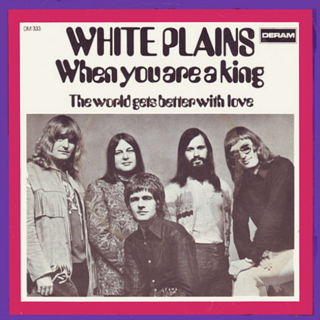
"When You Are a King" is a 1971 pop song by British band White Plains with Pete Nelson on lead vocals. It was written by John and Roger Hill, in contrast to most White Plains songs that were written by Roger Cook and Roger Greenaway. Roger Greenaway did produce the song.
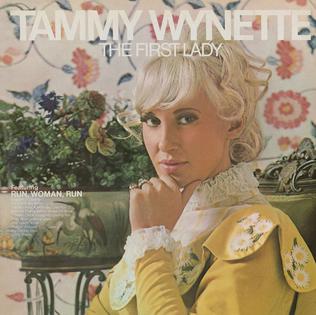
The First Lady is a studio album by American country artist, Tammy Wynette. It was released on October 5, 1970 via Epic Records and contained 11 tracks. It was the ninth studio album in Wynette's career. The disc featured both new material and covers of previously-recorded material. Many of the recordings featured on the disc centered around themes about housewives keeping their spouses happy. The First Lady reached positions on both the American country albums and pop albums charts. Its only single, "Run, Woman, Run", topped the country charts. The album was met with mixed reviews following its release.

















